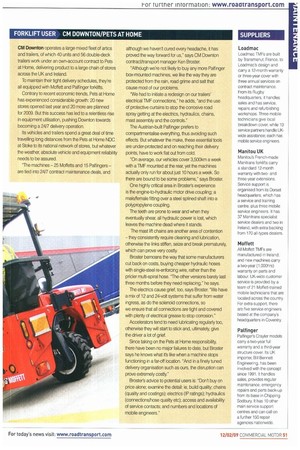FORKLIFT USER CM DOWNTOWPETS AT HOME
Page 51

If you've noticed an error in this article please click here to report it so we can fix it.
CM Downton operates a large mixed fleet of artics and trailers, of which 40 units and 56 double-deck trailers work under an own-account contract to Pets at Home, delivering product to a large chain of stores across the UK and Ireland.
To maintain their tight delivery schedules, they're all equipped with Moffett and Palfinger forklifts.
Contrary to recent economic trends, Pets at Home has experienced considerable growth: 20 new stores opened last year and 20 more are planned for 2009. But this success has led to a relentless rise in equipment utilisation, pushing Downton towards becoming a 24/7 delivery operation.
Its vehicles and trailers spend a great deal of time travelling long distances from the Pets at Home NDC at Stoke to its national network of stores, but whatever the weather, absolute vehicle and equipment reliability needs to be assured.
"The machines -25 Moffetts and 15 Palfingers are tied into 24/7 contract maintenance deals. and although we haven't cured every headache, it has proved the way forward for us," says CM Downton contractAransport manager Ken Broster, "Although we're not likely to buy any more Palfinger box-mounted machines, we like the way they are protected from the rain, road grime and salt that cause most of our problems.
"We had to initiate a redesign on our trailers' electrical TMF connections," he adds, "and the use of protective curtains to stop the corrosive road spray getting at the electrics, hydraulics, chains, mast assembly and the controls."
The Austrian-built Palfinger prefers to compartmentalise everything, thus avoiding such effects, But whatever the make, these essential tools are under-protected and on reaching their delivery points, have to work flat out from cold.
"On average, our vehicles cover 3,500km a week with a TMF mounted at the rear, yet the machines actually only run for about just 10 hours a week. So there are bound to be some problems," says Broster.
One highly critical area in Broster's experience is the engine-to-hydraulic motor drive coupling; a male/female fitting over a steel splined shaft into a polypropylene coupling.
The teeth are prone to wear and when they eventually shear, all hydraulic power is lost, which leaves the machine dead where it stands.
The mast lift chains are another area of contention they consistently require cleaning and lubrication, otherwise the links stiffen, seize and break prematurely, which can prove very costly.
Broster bemoans the way that some manufacturers cut back on costs. buying cheaper hydraulic hoses with single-steel re-enforcing wire, rather than the pricier multi-spiral hose. "The other versions barely last three months before they need replacing," he says.
The electrics cause grief, too. says Broster. "We have a mix of 12 and 24-volt systems that suffer from water ingress, as do the solenoid connections, so we ensure that all connections are tight and covered with plenty of electrical grease to stop corrosion."
Accelerators tend to need lubricating regularly too, otherwise they will start to stick and, ultimately, give the driver a lot of grief.
Since taking on the Pets at Home responsibility, there have been no major failures to date, but Broster says he knows what it's like when a machine stops functioning in a far-off location. "And in a finely tuned delivery organisation such as ours, the disruption can prove extremely costly."
Broster's advice to potential users is: "Don't buy on price alone; examine the detail: le, build quality; chains (quality and coatings); electrics (IF ratings); hydraulics (connections/hose quality etc); access and availability of service contacts; and numbers and locations of mobile engineers."
































































































































































